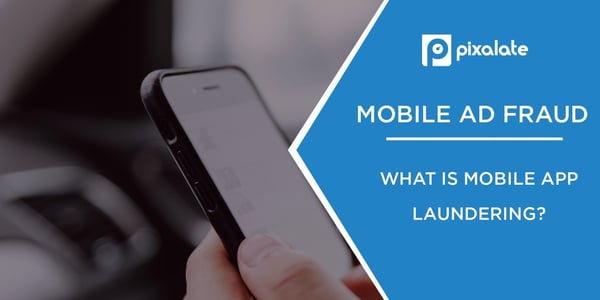
This week's review of ad fraud and quality in the digital advertising space.

Tyler Loechner, Marketing Manager at Pixalate, sat down with RhythmOne’s Karim Rayes, Senior Vice President, Products and Business Development, to discuss the unique challenges of battling invalid traffic (IVT) within mobile apps.
"The greatest challenge is that today’s fraudsters are using highly sophisticated, ever-evolving tools to replicate in-app consumer behavior," said Rayes. Read the whole Q&A.

In this post, Pixalate explains mobile app laundering, a type of mobile ad fraud and Sophisticated Invalid Traffic (SIVT) that costs advertisers millions of dollars. The mobile in-app landscape is rife with invalid traffic (IVT), with mobile ad fraud rates nearing 25%. Mobile app laundering is one of the most advanced ways in which fraudsters are stealing mobile app ad budgets.

"In a July 2018 survey of 800 brand and agency marketers worldwide conducted by Warc, agency respondents said that their lack of understanding of available technologies is the biggest impediment to greater investment in marketing tech," reported eMarketer. "Brand respondents reported that confusion of the technology is the second biggest obstacle preventing them from investing more in marketing tech."

Uber is now running most of its media buying in-house, reported Digiday. "For Uber, the decision wasn’t about saving money but rather a desire for ownership and a transition in how they were advertising," wrote Digiday. "Uber also hasn’t had the best experience in the agency world," the article added. "In September 2017, Uber filed a suit against Fetch, alleging the Dentsu-owned mobile ad agency misrepresented how effective its media buys were and purchasing nonexistent and fraudulent ads for Uber."

"MediaMath will stop buying from supply partners that play auction games, preferring to create an economic incentive for fair, transparent programmatic auctions and put an end to auction manipulation," reported AdExchanger. MediaMath this week sent a letter to its 50 directly-integrated supply partners, per the article.
"The letter asks the exchanges to sign a document with a 13-point checklist of behavior they pledge to avoid," AdExchanger noted, "The checklist prohibits behavior such as bid caching and misuse of the wrapper, sending duplicate bid requests, masking domains or adding data to the bidstream."
Sign up for our blog to stay updated with new stats, trends, and analysis of digital ad fraud.
*By entering your email address and clicking Subscribe, you are agreeing to our Terms of Use and Privacy Policy.
These Stories on Weekly Recaps
*By entering your email address and clicking Subscribe, you are agreeing to our Terms of Use and Privacy Policy.

Disclaimer: The content of this page reflects Pixalate’s opinions with respect to the factors that Pixalate believes can be useful to the digital media industry. Any proprietary data shared is grounded in Pixalate’s proprietary technology and analytics, which Pixalate is continuously evaluating and updating. Any references to outside sources should not be construed as endorsements. Pixalate’s opinions are just that - opinion, not facts or guarantees.
Per the MRC, “'Fraud' is not intended to represent fraud as defined in various laws, statutes and ordinances or as conventionally used in U.S. Court or other legal proceedings, but rather a custom definition strictly for advertising measurement purposes. Also per the MRC, “‘Invalid Traffic’ is defined generally as traffic that does not meet certain ad serving quality or completeness criteria, or otherwise does not represent legitimate ad traffic that should be included in measurement counts. Among the reasons why ad traffic may be deemed invalid is it is a result of non-human traffic (spiders, bots, etc.), or activity designed to produce fraudulent traffic.”

